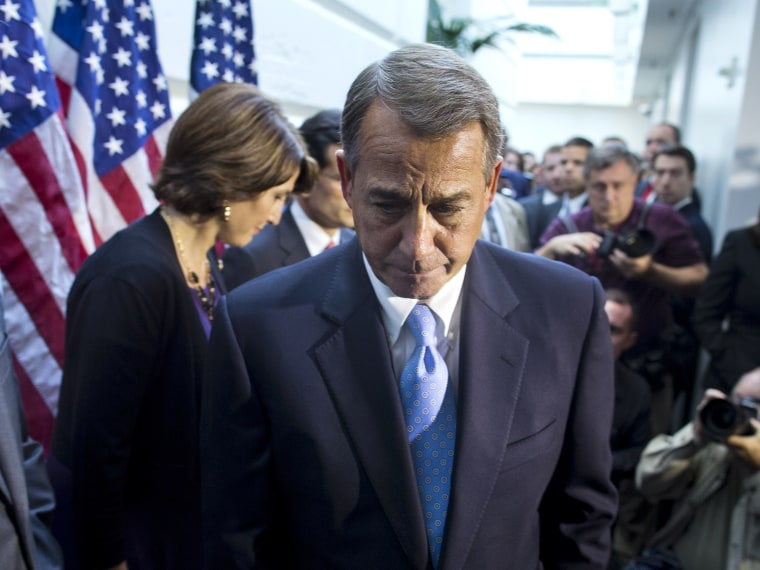Looking through the coverage this morning of last night's Capitol Hill drama, I came across a headline that read, "Speaker John Boehner Wins Big In Spending Bill Fight." It's apparently a fairly common take on the developments -- John Boehner fought the good fight and came out a winner.
The vote was also a big win for Boehner, Majority Leader Kevin McCarthy (R-Calif.) and Majority Whip Steve Scalise (R-La.). Scalise's whip operation was under heavy pressure on this vote, and he was able to keep members in line despite a long delay in the final vote.
At a certain level, that makes sense, right? Purely on a surface level, Boehner was determined to avoid a shutdown, he came up with a legislative game plan, and the package he endorsed ended up passing. The Speaker hasn't had many successes since getting the gavel four years ago, so maybe this counts a triumph for the Ohio Republican.
Or maybe not.
If we consider recent developments solely on the basis of wins and losses -- it's a binary model in which a bill either passes or it doesn't -- then the Speaker and his backers have reason to be pleased. But let's not pretend that Boehner actually led effectively.
He endorsed the so-called "CRomnibus" spending package and urged his own members to help him pass it. Several dozen of Boehner's ostensible followers -- literally, more than a fourth of the House Republican caucus -- ignored his leadership and did the opposite.
Just 24 hours ago, the Speaker expressed optimism about the bill, only to discover soon after that he didn't have the votes. Boehner struggled to introduce the legislation; he struggled to persuade his allies about the legislation's merits; he struggled with the procedural vote; and with just hours remaining until the shutdown deadline, the Speaker seemed to have absolutely no idea how to get out of the mess he and his party had created.
Were it not for President Obama and White House officials urging House Democrats to grudgingly support the bicameral agreement, it seems pretty obvious that this bill would have failed.
A triumph for John Boehner? Hardly.
The general argument from the Speaker's defenders is that he usually finds a way to prevent House Republicans from causing a complete disaster. I suppose there's some truth to that, though it's setting the bar awfully low -- since Boehner rose to power, GOP lawmakers have not yet caused catastrophic damage to the country. I'm glad, but I'm reluctant to characterize this as evidence of success.
Rep. Tom Cole (R-Okla.), one of Boehner's closest allies, recently said, "He's never wanted to just be Speaker. He's wanted to be a historically significant Speaker."
That's a worthy goal, though no one names buildings after leaders whose acclaim is limited to "he usually stopped radicals from doing real damage."
The next question is whether Boehner's job will be easier or harder in the next Congress, when the House Republican caucus reaches its largest size in generations. Will the Speaker now enjoy a buffer that will make it easier for him to pass whatever he pleases, or will have a larger insurgent force on the right that makes his challenges worse?
